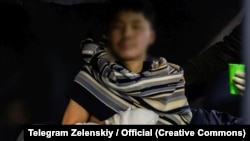Ukraine's Military Intelligence (HUR) says two North Korean soldiers captured while fighting for Russia continue to be interrogated with Kyiv ready to swap them for Ukrainian troops held by Moscow if North Korean leader Kim Jong-un can arrange such an exchange.
Speaking to RFE/RL's Ukrainian Service on January 13, Yevhen Yerin, a representative of HUR, said the capture of live North Korean soldiers, the first Ukraine has announced since their entry in support of Russia into the nearly 3-year-old war last autumn, provides Kyiv "many useful opportunities."
"The information we can gather from these individuals is important not only for operational intelligence but also as a political tool to reveal the participation of the North Korean Army in Russia's military actions," he said.
The capture of the two wounded soldiers, announced on January 11 by President Volodymyr Zelenskiy, has yet to be confirmed by either Moscow or Pyongyang.
Last fall, North Korea sent some 11,000 troops to the Kursk region to support Russian forces there. Moscow has reclaimed some 40 percent of the territory, but Ukrainian troops still control more than 500 square kilometers in Kursk, and Pyongyang's troops have reportedly been experiencing mass casualties.
Yerin said it appears North Korean soldiers are being integrated into many parts of the battle in Russia's Kursk region, where Ukraine has taken control of some territory.
"They are primarily used as cannon fodder. However, among them there are various specialists who deal with different issues, but in general, they are, generally speaking, infantry," he said on North Korean soldiers fighting in support of Russia.
Earlier on January 13, South Korea's National Intelligence Service reported that more than 300 North Korean soldiers had been killed in the Russian region of Kursk, with around 2,700 more injured.
The Ukrainian Security Service (SBU) said one prisoner, who said he was born in 2005, claimed he believed he was "going for training, not to fight a war against Ukraine."
The other man was forced to write his answers because of an injured jaw, the SBU said. That soldier said he was born in 1999 and was a sniper in the North Korean Army.
One of the soldiers purportedly said he would prefer to stay in Ukraine rather than return to North Korea for fear of "severe punishment" from his government, saying he possibly faces execution or a lengthy imprisonment.
"North Korea's participation is not only a matter on the battlefield -- it has big diplomatic implications," Yerin said.
"The very fact that they are there impacts the dynamics of the war, even though they're mostly 'cannon fodder.'"
Zelenskiy has publicly accused Russia and North Korea of trying to cover up evidence of the deployments by issuing fake papers to North Korean soldiers identifying them as Russian citizens.
Kremlin spokesman Dmitry Peskov on January 13 declined again to comment on the situation, which Russia has neither confirmed nor denied.
"We cannot comment in any way, we do not know what is true there," he said of the Ukrainian claims on capturing the two soldiers.
"We continue to discuss the possibility of exchanges, which is not easy work...but for us the life of every Russian soldier is important," Peskov added.












